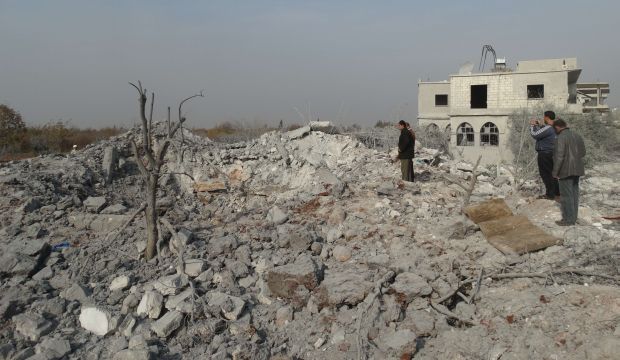
Syrians inspect the damage following a reported US-led coalition air strike in the town of Harem in the northwestern province of Idlib, bordering Turkey, on November 19, 2014. (AFP PHOTO/MOHAMAD ZEEN)
The strike marked the fourth time the US has targeted the Al-Nusra Front, Al-Qaeda’s Syrian branch, as part of its broader campaign against the Islamic State of Iraq and Syria (ISIS).
The strike hit a storage facility controlled by the Al-Nusra Front near the town of Harem, US Central Command said in a statement. It was one of five airstrikes conducted by the coalition in Syria since Monday, the military said.
US Central Command said the strike targeted the so-called Khorasan group, which Washington says is a special cell within Al-Nusra that is plotting attacks against Western interests.
Inside Syria, activists and rebels dismiss the US attempt to distinguish between the two, saying they are one entity. Many analysts also question the distinction.
Harem is considered a strategically important border town, because it lies on a chief smuggling route to Turkey from northwestern Syria. The strike also was reported by local activists and the Britain-based Syrian Observatory for Human Rights. The Observatory said the strike killed two Al-Nusra Front fighters.
The US says it isn’t coordinating its aerial operation in Syria with President Bashar Al-Assad, whose own air force has been pummeling opposition-held areas from the sky since the international coalition’s campaign began in late September.
The Observatory said Wednesday that Syrian aircraft have carried out nearly 1,600 airstrikes since October 20. It said at least 396 people, including 109 children, have been killed in those strikes.
On Wednesday, a government strike hit the northeastern city of Raqqa, controlled by ISIS, killing at least nine people, the Observatory and local activist Fourat Alwfaa said. Alwfaa said that those killed in the attack were civilians.
Another strike hit the town of Al-Hara in southern Syria, killing eight people, including four children and a woman, the Observatory said. An activist group in Daraa also reported the strikes, but offered no casualty figures.
In Iraq, Kurdish forces launched a new offensive on Wednesday, targeting ISIS extremists as a suicide bomber killed at least five people in the Kurds’ regional capital.
The operation came as Turkish President Recep Tayyip Erdoğan said details haven’t been finalized for a deal that would have his country train rebels to battle ISIS in Syria.
As well as striking at Al-Nusra targets, the US has continued to lay a leading role in coalition’s airstrikes that have helped halt ISIS’s attempts to take the Syrian city of Kobani near the Turkish border, and enabled Iraqi forces to make key advances. On Tuesday, the Kurds captured six ISIS-controlled buildings in Kobani and confiscated a large amount of weapons and ammunition, the Britain-based Syrian Observatory for Human Rights said.
In Iraq, the new offensive by Kurdish forces, known as the Peshmerga, targeted areas in Diyala and Kirkuk provinces, said Jaber Yawer, a Peshmerga spokesman. The ISIS extremists had seized the territory in their August offensive that saw them capture a third of Iraq.
In Diyala, the Peshmerga worked with Iraqi security forces to retake the towns of Saadiya and Jalula, Yawer said. In Kirkuk, Kurdish forces backed by coalition airstrikes launched attacks to retake territory near the town of Kharbaroot, located 22 miles (35 kilometers) west of the city of Kirkuk.
The offensive began as a suicide car bomber struck in the heart of Irbil, killing at least five people, officials said. No group immediately claimed responsibility for the midday attack in the capital of the semi-autonomous Kurdish region, though authorities suspect ISIS. Authorities also suspect ISIS was behind three Baghdad bombings that killed at least 10 people and wounded almost 30.
Turkey, while previously backing Syrian rebels fighting to topple President Bashar Assad, has been hesitant to aid the Kobani fight over its own fears about stoking Kurdish ambitions for an independent state. On Wednesday, Erdoğan said no deal had been finalized for Turkey to train rebels under the auspices of the US-led operation against ISIS.
“If we only talk about train and equip, we would be lying to ourselves,” Erdoğan said, reiterating that overthrowing Assad must be a priority as well.
Retired Marine Gen. John Allen, the US envoy for the international coalition, held talks with Turkish officials in Ankara on Wednesday but few details were released.
ISIS group has declared a self-styled Islamic caliphate in areas under its control in Iraq and Syria, governing it according to its violent interpretation of Shari’a law. The group has carried out mass killings targeting government security forces, ethnic minorities and others against it, including a video released Sunday with militants showing they beheaded American aid worker Peter Kassig.
Among the militants in that video were two French citizens, identified by the government in Paris as Maxime Hauchard, 22, and Mickael Dos Santos, 22. Both men were said to have left for Syria in August 2013.
France also said Wednesday it would send an additional six fighter jets to back the US-led coalition. The jets will be deployed next month to Jordan, reducing the flying time to Iraq, said Col. Gilles Jaron, a French military spokesman. France already has 12 aircraft taking part in strikes in Iraq.

Trackbacks/Pingbacks